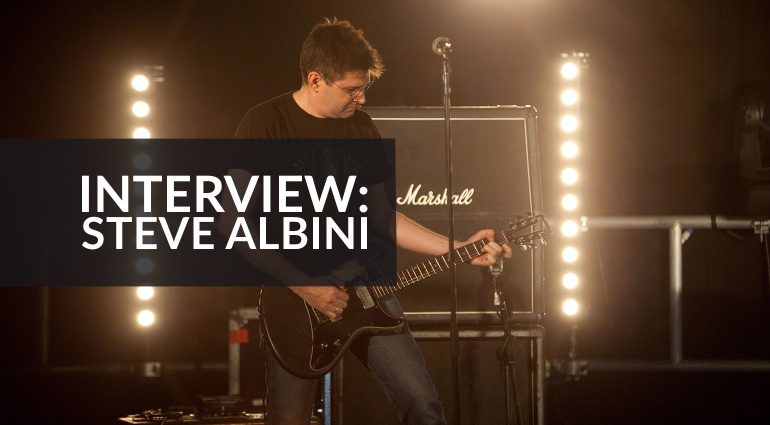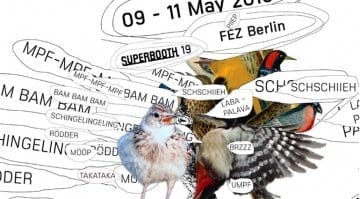Steve Albini Interview: The Producer’s Producer
Steve Albini interviewed by Paul Rigg
We get up close and personal with legendary producer, guitarist, and engineer Steve Albini, a musical hero of many and a pioneer of the music-making process.
Steve Albini Interview
This interview was originally conducted by Paul Rigg for Planet Guitar.
From wearing his guitar strap around his waist to his pioneering moral stance in not charging bands royalties; from asking that his name isn’t mentioned on albums to improving guitar brands by smashing them to smithereens; Steve Albini is ‘a bold thinker who doesn’t give a hoot for tradition’ or, in one word, an: iconoclast.
Albini has gained a cult following as a musician in bands like Big Black and Shellac, but through his bravery, integrity, and commitment to ‘fans and musicians’ has also enabled thousands of groups to ‘find their sound’ including The Pixies, Iggy & The Stooges, Cheap Trick, and PJ Harvey, among many others.
Today, in mid-May 2023, Albini takes a break from his relentless schedule to give Gearnews an exclusive insight into his origins, what drives his beliefs, and his thus far hidden passion…
Gearnews: Welcome, Steve; how is Chicago these days?
Steve Albini: Great, we’ve just elected the city’s first unabashedly progressive mayor and I‘m very much looking forward to seeing what happens.
GN: You’ve lived there for years; what do you love about it?
SA: There are a lot of practical things that are great. You can get anywhere easily, which is very helpful for touring, and in my business, I occasionally need welded parts or machining done, and this is the place to do it. Also, the music scene here is the best; I really can’t imagine loving a city more than I love Chicago.
You are currently viewing a placeholder content from YouTube. To access the actual content, click the button below. Please note that doing so will share data with third-party providers.
“…can’t imagine loving a city more than I love Chicago.”
GN: …though your family are from Northern Italy…
SA: Yes, they are Piedmontese. My paternal grandfather emigrated to the US with no English or formal education; they just lived off their wits. On my mother’s side, they moved earlier to northern California where they grew olives and made olive oil.
GN: Do you continue to have a relationship with your family town?
SA: Not really, though one time I was in Torino and we went to a little family-owned restaurant where people addressed me in the local dialect because I looked like one of them. I have certain Piedmontese characteristics, such as my extremely long gangly limbs, blue eyes, and black hair; apparently uncommon in other parts of Italy.


Steve’s Musical Origins
GN: Did you grow up in a musical family?
SA: My mother played organ at the church and my father played folk songs on guitar. We didn’t have musical training at home; no family sing-a-longs, or anything like that.
GN: What was your first instrument?
SA: In school, I learned clarinet but when I discovered punk rock I wanted to be in a band and the simplest-looking instrument was the bass guitar. My first was a Peavey T-40 from the local music store in Missoula, Montana.
GN: Have you still got it?
SA: It was smashed when Big Black played our final concert and destroyed all our equipment.
You are currently viewing a placeholder content from YouTube. To access the actual content, click the button below. Please note that doing so will share data with third-party providers.
Punk Rock Influences
GN: What is your current guitar?
SA: I have had a Travis Bean TB500 since I started Shellac in 1992.
At a show in Detroit once I was hitting the headstock against the amplifier, and I broke the whole middle of the guitar out. But when that guitar was reassembled, Terry Straker, a luthier at Guitar Works in Evanston, a Chicago suburb, made a rectangular aluminum plate that covered the vulnerable part of the guitar to buttress it, and that plate was later incorporated as a standard feature. It adds weight, but makes an enormous difference to its stability.
GN: In your early years you were influenced by pioneers like The Ramones, Pere Ubu, the Sex Pistols, and The Fall – is it fair to say that punk has been both a musical inspiration and a guide for your whole life?
SA: Yes, it is very fair to say that. My business practice and ethics can be traced back to being in a self-sufficient, independent, underground, punk band, and that shaped my whole worldview. You can behave honestly and decently and give people a fair shake. That approach influences everything in my life.
You are currently viewing a placeholder content from YouTube. To access the actual content, click the button below. Please note that doing so will share data with third-party providers.
“Many in the music business are parasites…”
GN: You are well-known for your strong moral position about refusing to take royalties; does it matter if others follow your lead?
SA: No, I am not evangelist. My stance makes me feel comfortable and I feel intuitively that I am being fair to those I work with. Many in the music business are parasites and do damage to the core project: the band. I simply don’t want to behave that way.
GN: You once said: “I like big-ass vicious noise that makes my head spin,” but you have worked with bands who are very different – like Mono, and classical musicians. What unites these diverse choices?
SA: I think you have struck on something that is a weakness of a lot of people in my position. Many recording engineers or producers aspire to work on projects that suits them, that they like. But it genuinely doesn’t matter to me what kind of music my clients make. I try very hard to not even form opinions about the music I work on. If I feel like I’m becoming a fan, I have to step back to do my job properly.

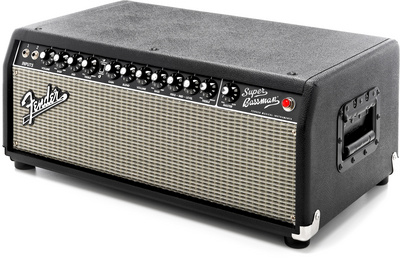
“I try hard to not form opinions about the music I work on.”
GN: You didn’t particularly like Nirvana’s ‘Nevermind’, yet you agreed to engineer ‘In Utero’; when did you say to yourself: “Yes, I want to do this”?
SA: First, I am not in a position to turn down work. Regarding Nirvana, it would have been impossible for me to get involved without being conscious of the meta-implications of working with the biggest band in the world.
More importantly, Nirvana had become big by being a conventional, underground, rock band: they played the same venues that my bands played, had the same friends, and same experiences, so we could communicate very easily.
They could make a Killdozer or Necros reference, and I would know what they were talking about, and that mattered a lot.
You are correct, I wasn’t a fan at the start but seeing the band up close and seeing how they were structured, listening to Kurt who I think was a generational talent – uniquely able to evoke an emotional state with his voice – gave me a new appreciation for them, and by the end, I became a fan, and think they were a great band.
You are currently viewing a placeholder content from Default. To access the actual content, click the button below. Please note that doing so will share data with third-party providers.

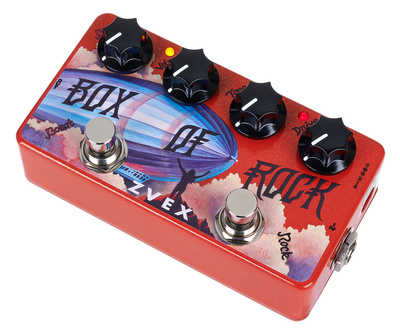
GN: Joy Division were surprised that their albums sounded very little like they did live; do you think their producer over-stepped the mark?
SA: Well, it seemed like Martin Hannett took control of the sound and in some cases acted as if he were superior to the band members. That’s not my approach, but I loved [Unknown Pleasures and Closer], and I’m not going to argue that they made a mistake. For the record I do prefer the stuff on their bootlegs and live record, such as Warsaw, but I’m not going to question their studio records, because I think they’re amazing.
You are currently viewing a placeholder content from YouTube. To access the actual content, click the button below. Please note that doing so will share data with third-party providers.

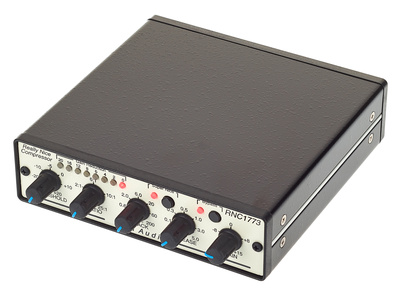
Outside Of Music
As our interview winds down, Albini reveals that Shellac has a brand-new album that will hit the shelves once the pressing plants clear their post-COVID backlog. That has been worked on, of course, alongside all his other recording and business duties plus, as I remind him, his active interests in: painting, photography, journalism, cooking, playing poker, and charitable work.
That would be more than enough for most, but when I cheekily ask him if he has any other hidden passions, he laughs as he admits to woodworking.
“When a table, stool, or shelving unit made with hand-tools becomes a part of your normal household furniture, it is supremely gratifying,” he says. Steve Albini; iconoclastic to the last!
More about Steve Albini:
*Note: This article contains affiliate links that help us fund our site. Don’t worry: the price for you always stays the same! If you buy something through these links, we will receive a small commission. Thank you for your support!

 3,8 / 5,0 |
3,8 / 5,0 | 